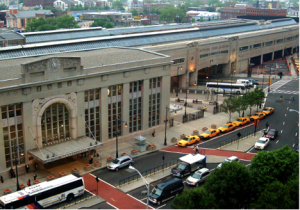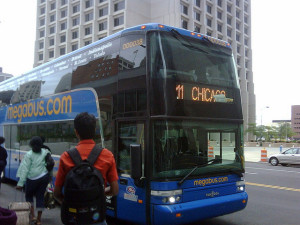Globalization, technology, productivity improvements, and the resulting restructuring of the world economy have led to fundamental changes that have destroyed the old paradigms of doing business. Whether these changes are on the whole good or bad, or who or what is responsible for bringing them into being, they simply are. Most cities, regions, and US states have extremely limited leverage in this marketplace and thus to a great extent are market takers more than market makers. They have to adapt to new realities, but a lack of willingness to … [Read more...]
Blurring the Lines
"We believed then as we do now, that the sharing economy can democratize access to goods, services, and capital — in fact all the essentials that make for vibrant markets, commons, and neighborhoods. It’s an epoch shaping opportunity for sustainable urban development that can complement the legacy economy. Resource sharing, peer production, and the free market can empower people to self-provision locally much of what they need to thrive. Yet we’ve learned that current U.S. policies often block resource sharing and peer production. - From the … [Read more...]
The Mayor As Entrepreneur-in-Chief
[ Ramsin Canon is one of the most keen left political observers I know in Chicago. Among other things he's been the politics editor at Gapers Blocks, a union organizer, and is now a law student I believe. Needless to say, he's no fan of "neoliberalism", even when practiced by those on the left. Here he provides his frame and critique of the current reigning governance model in our various levels of government re:cities. I may revisit this topic with my own thoughts in the future, but I'd like to make a couple of observations here. 1) Canon sees … [Read more...]
The Tough Realities Facing Smaller Post-Industrial Cities
A couple weeks ago the Economist ran a leader and an article on the plight of smaller post-industrial cities, noting that these days the worst urban decay is found not in big cities but in small ones. They observe: Partly, this reflects the extraordinary success of London and continuing deindustrialisation in the north of England. Areas such as Teesside have been struggling, on and off, since the first world war. But whereas over the past two decades England’s big cities have developed strong service-sector economies, its smaller industrial … [Read more...]
Grand Central Terminal And Penn Station: Will The Beauty and The Beast Ever Get Married?
This post is part of a series by Robert Munson called North America’s Train Stations: What Makes Them Sustainable — or Not? See the series introduction for more. Photo by the author to celebrate GCT’s 100th anniversaryIn today’s tale, Grand Central Terminal is The Beauty. Admired also for her goodness, she touches souls in ways most civic buildings cannot. Many souls, such as this author, find her exquisite. So when our mid-Century trend of destroying beautiful buildings put GCT on the demolition list, the public’s stored-up admiration … [Read more...]
Highways, Casinos, and Bridges, Or the Insatiable Demand for Boondoggle Highways
A friend of mine recently summed up the mindset of all too many when it comes to economic development: This bunch loves casinos and highways and bridges and hates mass transit. Highways and bridges and casinos are their answer to every problem: Tax base eroding? Build a casino. Urban congestion? Build a highway. Can't get to casinos? Built a bridge. Undeveloped backwoods counties? Build a highway AND a casino AND more bridges. Jobs recovery slow? Build a highway. This is on display yet again in Indiana. Politicians in southwest Indiana spent … [Read more...]
Using Placemaking to Serve the Needs of Industry
[ Quality of place improvements tend to be targeted at high end demographics downtown and such. In this piece Rod Stevens and Gregory Tung talk about how the needs of industry for better quality places should not be overlooked - Aaron. ] In a recent posting on “The Promise and Peril of Rust Belt Chic” Aaron Renn contrasts the goals of self-affirmation with the Richard Florida approach of hipster havens. There is a division here between creating jobs and place-making, a gulf that has never been bridged between economic gardening and New … [Read more...]
Asking the Wrong Question On Amenities
The Indianapolis Star ran a major article on Sunday that provides a view of the new suburban reality facing many place in America. Called "Amenities reflect Indianapolis suburbs' new goals" it describes the efforts of various suburbs around Indy to move away from purely a schools/rooftops/retail model of the suburb to one that offers other amenities such as first class parks, New Urbanist town centers, arts venues, etc. Incidentally, the five or so featured are all completely run by Republicans, showing again that local level Republicans today … [Read more...]
Newark Penn Station
This post is part of a series called North America’s Train Stations: What Makes Them Sustainable — or Not? See the series introduction for more. Photo from City of Newark websiteA visual pleasure inside and out, Newark’s Penn Station is more than a pretty face. An excellent workhorse, this station helped save one of America’s most troubled cities. Seemingly married to a special Destiny, this station was born in spite of the Great Depression and has endured as a leading Economic Engine; pulling its city through half a Century of … [Read more...]
Megabus – King of the Road
This post originally appeared on August 18, 2011. Source: Flickr/BudahblessIn recent years there's been a resurgence in intercity bus travel, driven by the rise of low cost, non-stop service linking tier one cities like New York, Chicago, and Washington, DC with other regional hubs in their surrounding areas. This is a lively and diverse market, particularly on the east coast, with providers like Megabus, Bolt Bus, Greyhound, and a host of so-called "Chinatown" buses [update: who find themselves on the regulatory run, probably at … [Read more...]
- « Previous Page
- 1
- …
- 16
- 17
- 18
- 19
- 20
- …
- 36
- Next Page »



